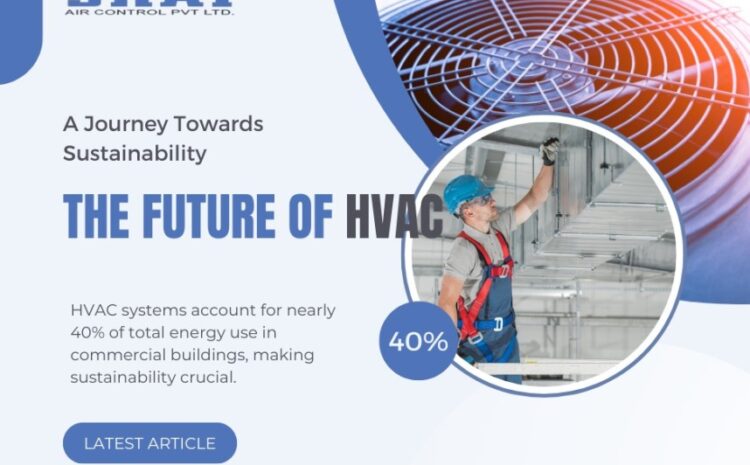
How the HVAC Industry is Growing for Sustainability
The HVAC industry is important in energy consumption and environmental impact worldwide.
With HVAC systems accounting for nearly 40% of total energy use in commercial buildings, the need for sustainable practices in this industry is paramount.
This article delves into the evolution of the HVAC industry towards sustainability, exploring the latest trends, industry changes, consumer impact, and future developments.
In-depth Look at Sustainable HVAC Trends
The HVAC industry is witnessing a paradigm shift towards sustainability, driven by technological advancements and a growing awareness of environmental concerns.
Let’s explore some of these key trends.
Energy-Efficient HVAC Systems
Energy efficiency is at the forefront of sustainable HVAC trends.
Modern HVAC systems are designed to provide the same comfort level while consuming less energy. For instance, high-efficiency furnaces and air conditioners use advanced technology to maximize heat transfer and minimize energy loss.
These systems reduce energy consumption and lower utility bills, providing a win-win situation for consumers and the environment.
Smart Technology in HVAC Systems
The integration of smart technology into HVAC systems is revolutionizing the industry. Smart thermostats and sensors can optimize HVAC operation in real-time, yielding adequate energy savings.
For example, smart thermostats can alter the temperature based on occupancy or time of day, reducing energy waste when no one is home or during cooler nights.
Renewable Energy Integration
The HVAC industry is increasingly harnessing renewable energy sources to power systems. Solar-powered air conditioning and geothermal heating systems are becoming more common.
These systems reduce reliance on fossil fuels, lower greenhouse gas emissions, and generate surplus energy that can be fed back into the grid.
Eco-Friendly Refrigerants
The HVAC industry is moving away from refrigerants that contribute to global warming. New types of refrigerants with lower Global Warming Potential (GWP) are being developed and used, reducing the environmental impact of HVAC systems.
Regulatory and Industry Changes Promoting Sustainability
Regulatory bodies and industry standards are evolving to promote sustainability in the HVAC industry.
These changes drive manufacturers to innovate and consumers to adopt more sustainable practices.
Regulatory Changes
Recent regulatory changes have set stricter energy efficiency standards for HVAC systems. These regulations are pushing manufacturers to develop more efficient and environmentally friendly products.
For example, the U.S. Department of Energy has set minimum efficiency standards for HVAC equipment, driving innovation in the industry.
Industry Adaptation
HVAC companies adapt to these changes by focusing on sustainability in their business practices.
From the design and manufacturing process to installation and maintenance, companies are implementing practices that reduce environmental impact.
This includes using sustainable materials, reducing waste in the manufacturing process, and offering services like energy audits and eco-friendly maintenance.
Consumer Impact and Benefits
The shift towards sustainable HVAC systems has significant benefits for consumers. These include cost savings, improved comfort, and the satisfaction of contributing to environmental conservation.
Cost Savings
Energy-efficient HVAC systems can provide significant cost savings for consumers. These systems can reduce utility bills by up to 20-30% by consuming less energy.
Additionally, many jurisdictions offer tax credits and incentives for installing energy-efficient HVAC systems, reducing costs.
Improved Comfort
Sustainable HVAC systems often provide better comfort.
For example, variable-speed technology systems can maintain more consistent temperatures and humidity. Smart HVAC systems can also provide personalized comfort by allowing users to control their HVAC systems remotely via smartphone apps.
Forecasting the Future of Sustainable HVAC
The future of the HVAC industry lies in sustainability. Emerging technologies and practices promise further to enhance the efficiency and environmental friendliness of HVAC systems.
Emerging Technologies
Technologies like AI and IoT are set to revolutionize the HVAC industry.
AI can examine extended amounts of data to optimize HVAC operation, while IoT devices can provide real-time monitoring and control of HVAC systems.
These technologies can enhance energy efficiency and provide a more personalized and comfortable environment.
Future Trends
The trend towards net-zero energy buildings will drive the demand for highly efficient and renewable energy-powered HVAC systems.
Additionally, eco-friendly refrigerants are expected to become the norm as the industry moves away from traditional refrigerants contributing to global warming.
Conclusion
The HVAC industry is evolving rapidly towards sustainability, driven by technological innovation, regulatory changes, and increasing consumer demand for eco-friendly options.
As we move towards a more sustainable future, the HVAC industry will be crucial in reducing energy consumption and mitigating environmental impact.
By embracing these changes, consumers can enjoy cost savings, improved comfort, and the satisfaction of contributing to a more sustainable world.
